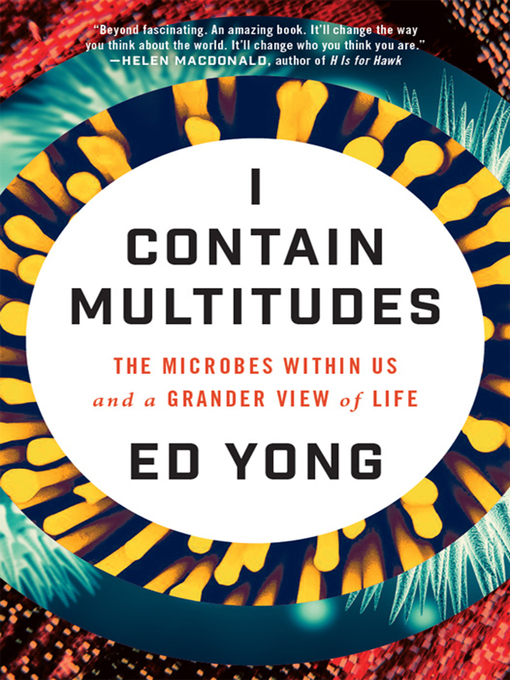
I Contain Multitudes
The Microbes Within Us and a Grander View of Life
میکروب های درون ما و یک نمای گراندر از زندگی
کتاب های مرتبط
- اطلاعات
- نقد و بررسی
- دیدگاه کاربران
نقد و بررسی

Starred review from May 30, 2016
British science journalist Yong succeeds in encouraging readers to recognize the critical importance of biological microorganisms. He argues that humans must move past the belief that bacteria are bad and need to be eradicated, and adopt a deeper understanding of the positive role they play in the lives of most organisms. Yong makes a superb case for his position by interviewing numerous scientists and presenting their fascinating work in an accessible and persuasive fashion. Throughout, he takes a holistic ecological perspective, contending that it makes no sense to examine bacteria in isolation. As in all ecological systems, context is everything, and the complex community structure of the microbiome does much to determine the effects of various bacteria. Yong demonstrates that this more inclusive view has led to a reconceptualization of how the immune system might work, how microorganisms can shape the development of organ systems, how bacteria might play a role in autism, and how the microbiome may influence an organism’s propensity for obesity. He also shows that scientists have moved beyond the theoretical by successfully performing “ecosystem transplants” of human gut microorganisms, and he envisions a future that includes “artisanal bacteria” designed to perform specific tasks. Yong reveals “how ubiquitous and vital microbes are” on scales large and small.

Starred review from June 15, 2016
The microbiome is one of the most talked-about topics in modern science, but it's a complex and evolving field with important nuances often missed by the media. Atlantic science writer Yong refines the natural history of these microscopic wonders and breaks down the cutting-edge science that may soon result in revolutionary medical advances.Simply put, the microbiome (or "microbiota") is the vast collection of bacteria, viruses, and other microscopic organisms that live in and on the bodies of animals. While scientists have long been aware of the presence of some microbes, their abundance and significance have only been truly understood with the advent of tools that reveal their genetic identity. As a result, specialists around the world are focusing on exactly how microbes affect the health of their hosts. In this sweeping and meticulously researched book, the author introduces many of these pioneering researchers, and through their experiments, he elucidates microbes' astonishingly wide-ranging roles. Prepare to meet some weird animals and weirder microbes, as Yong guides us through the animal kingdom to explain how microbes facilitate digestion, reproduction, and other functions integral to the survival of a species. In humans, microbes have been shown to regulate inflammation, an immune response linked to dozens of chronic conditions. In fact, in the absence of symbiotic microbes, life as we know it would quickly collapse--and yet it was only recently that microbes were understood to be more than disease-carrying bugs and more recently still that scientists have begun to understand their potential medicinal power. The author excels at objectively navigating the large body of research related to the microbiome without overselling its curative potential or sacrificing any of the deliciously icky details, and he delivers some of the finest science writing out there in language that will appeal to a wide audience. An exceptionally informative, beautifully written book that will profoundly shift one's sense of self to that of symbiotic multitudes.
COPYRIGHT(2016) Kirkus Reviews, ALL RIGHTS RESERVED.

March 15, 2016
As Yong's smartly titled work clarifies, we contain hordes of bacteria and other microbes, and they are not all bad. They build our bodies, protect us from disease, help us digest food, and more, and it would be wise to think of ourselves as a mass community of microbiomes rather than individuals. A new tilt to our worldview from an author whose blog, Not Exactly Rocket Science, hosted by "National Geographic", receives around 400,000 page views every month.
Copyright 2016 Library Journal, LLC Used with permission.

























دیدگاه کاربران